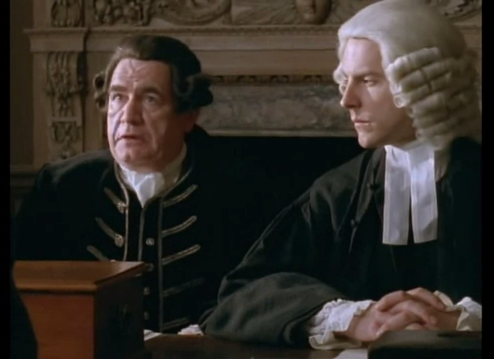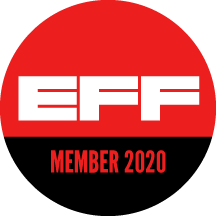A shot from the critical scene in Longitude:

I honestly never even thought that I would see such a clear image of the IP battle from this movie. I briefly spoke about the movie Longitude a few posts ago. The battle this one poor man (John Harrison) had while trying to invent a mechanism that would assist seafarers in acquiring accurate longitudinal measurements at sea was probably one of the most educational pieces showing the true nature of a constricting IP regime. If you want to know why people look at IP suspiciously, then you couldn’t ask for a more relevant portrayal of creator vs. system.
We tend to look at the creator with a mixture of sympathy (they just want to survive) and exasperation (why are they so entitled), but the main public conversation that should be taking place is the role of the gate keeper or investor. If you’ve been following the non-stop legislative battle (SOPA, PIPA, ACTA, TPP, and CISPA, etc.) that the Internet is having with global governments and industry, then you know that this conversation is happening though it has yet to reach those who can make system modernization happen. There are two camps:
Camp A – IP stakeholders: We have been funding this modern society, and deserve to be paid for creating the world that you now all enjoy. So in order for us to continue with these investments, we require an IP regime that allows for us to protect our valuable commodity. We want to ensure that “creators” are protected, so we require ever increasing legislation that will secure the world we worked so hard in achieving. Without us, you would not exist in such luxury. Protection is paramount for survival! Note: IP stakeholders typically hold title to patents and copyrights, but they are usually not the original content creators (e.g writer, designer, inventor, etc.).
Camp B – public domain supporters: We are the ones who are responsible for creating the actual content on which society thrives. We realize that no one lives in a vacuum, so we’re constantly impacted by external influences. Nothing is ever truly original, because there is always another source that inspires each new creation. We build upon the previous, and create something that is exponentially bigger than the previous. One cannot exist without the other. It belongs to us all, and it cannot be constrained by economics or self interest. A vibrant public domain allows for continuous innovation!
After watching that repugnant section of the movie when the leader of the board, Lord Morton, exclaimed, “Your watch, as you call it, is our watch…I have instructed the Astronomer Royale to collect the rest of the time pieces..because they are the property of this board.“, I found my perfect example of how investors seek to recoup on their investments by claiming ownership on everything related to their project with mutating boundaries that rarely reflect their true investment but always account for their ever-increasing demands for over-inflated value.
And that is how I and many others have realized that there is very little balance in the current IP regime. We have international organizations like WIPO who attempt to develop a balance approach to IP protection so that all people involved would have fair representation in the system. But as money supply reaches astronomical proportions in our modern era, we are discovering that the original system broke down because there was never fair representation of all parties within the existing system. And that’s where we stand today: adversaries calling insults to one another because neither side wants to give up valuable territory in the battle of property. Previous negotiations fall to the wayside as wealthy participants control more of the game, and force the creators to fight for scraps.
We need to realize that the 20th century model of property ownership has to change because not all creations should be considered as equal resources, when some values are incalculable. Money has established monetary value. We know that $20.00 buys us so much. But what about factoring in market impacts? Suddenly, that $20.00 isn’t the same as it was in 1900, because of the principles of economics. And can we then value an intangible, like an idea or invention, in the same manner as money? We have rules, but they are defined by who is in charge. The bigger fish always gets the worm, because they manage to eliminate all of the smaller fish. They call it a free market, but it can’t be when they are using advantages not present in free markets. So, creators get locked out because they lack influence. Basically, that movie scene never changed for all of our new laws. The bigger fish just grew in size.
Today, the Internet is allowing something that resembles free markets to thrive. Anyone with the drive can create opportunity for themselves. And we are seeing that some of the big fish can’t actually survive in a true free market. They need the crutches that come with legislation, IP protection, and support through institutional connections. When one creator argues that they are being protected by their specific organizations or lobbies, and yet pay to remove their opponents, then how can a system be judged as fair and impartial? It can’t when you take away things from your opponents unjustly.
It’s going to be hard to rework systems that are breaking down. But perhaps it seems impossible because we think that we have to start from scratch. We don’t. We’ve learned a lot through our history, and those lessons give us valuable starting points for a newer and fairer alternative. Whether it’s IP, or government, or education, the previous models beg to be used as new, stronger foundations for something better than before. All that’s required is that everyone get out of the mindset of “What’s in it for me?”, and start to think about “What will help this world become a better place?”.
When this conversation honestly starts between the populace, government, and industry, then maybe we can actually come up with the new 21st century model of prosperity in everything that we do. Our view towards property can stand to become much more responsible. When we have finite resources, so everyone needs to learn to share equally. We were all taught that lesson as children (I hope).
The Internet users understand that they are living within a unique and democratic domain that deserves to be protected from the old mentality of property. Much in the same way that governments sought protection by using mercenaries when seafaring became a global activity, and piracy was really about actual physical loss. The Internet has created a new model for sharing that allows us to build on what we all own. Since we all own it, then no one should be able to claim it as theirs because they “paid” for it. Paying with money is not the same thing as paying with your blood, sweat, and tears. Creations only become valuable when they are released to the world. And that’s a lesson that was reinforced in the movie, Longitude, when the sailors’ lives were saved by the amazing invention of John Harrison.
That’s what all of these global protests are about. A lot of people are done propping up broken systems and institutions.
p.s. As a writer and creator myself, I get the conflicts that exist on both sides. But if I have to choose between myself or the world, well, I have to get in line behind the world. Or better, do something with my skills that will help the world. Because the loss of our world will be much bigger than the loss of me or my skills.





